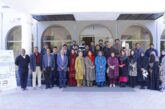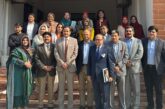ISLAMABAD: Bhagwan Das has is a lawmaker but even he, like every single member of his Hindu community living in Pakistan, cannot circumvent the ordeal when it comes registration of a marriage.
The Hindu community has a population of several millions in Pakistan but not a single law has been enacted to regulate marriage and divorce of Hindu citizens. After the independence in 1947, Muslim Family Laws were comprehensively revised but limited progress has been made to update laws relating to religious minorities.
Without any legal recognition of a marriage, Hindu women face problems in getting their names changed in their computerized national identity cards, passports, inheritance and dissolution of marriage.
“The dissolution of Hindu marriage is primarily based on the principles of customary usage and judicial separation. Some legal experts treat this judicial separation as absolute dissolution of marriage but variance in customary usage is discriminatory to women. This incoherence does persuades spouses to convert to Islam for ending marriages,” said a report titled “Religious Minorities and Marriage Laws in Pakistan,” by Community World Service Asia.
Das is a Member National Assembly from ruling Pakistan Muslim League-Nawaz [PML-N] on seats, reserved for religious minorities, and has a guilty conscience for not being able to push his government to fill the gap and enact much needed laws for his community.
Several bills were introduced in National Assembly by Dr. Darshan and Ramesh Lal in 2014 over the subject and Ramesh Kumar Vankwani from PML-N introduced Hindu Marriage Registration Act, 2014 with a focus on registration of marriages and prohibition of forced conversions. But, they are still pending.
“We cannot raise our issues like it was done by our predecessors,” Das said in an interview.
While explaining his argument, he referred to election criterion for minority members of the assembly as envisaged by the 18th Constitutional Amendment through which heads of political parties nominate minority members instead of their direct elections and said “those who were directly elected could raise their voice.”
Das said that the voice of members on reserved seats was not loud enough to attract attention of their issues.
Das, despite being a lawmaker, has faced legal hitches while getting registration of marriage, national identity card for spouse and travel documents.
Commenting on the issues being faced by his community, he said that people are migrating from Sindh and “they are not returning from India.”
“Things are going on but God knows how they are going in absence of laws?” said Ramesh Lal, MNA on reserved seats from the Pakistan Peoples’ Party [PPP] for second consecutive term.
Responding to a question, he said that several attempts were made and bills were introduced for the purpose but nothing really happened.
“Pakistan has not enacted any law to regulate marriage and divorce of its Hindu citizens, though they can opt to get their marriages registered under The Special Marriage Act 1872 but no effective measure have been taken so far to implement this law either,” said Advocate Maroof Mittha while talking to News Lens Pakistan.
Mittha had compiled a report titled “Religious Minorities and Marriage Laws in Pakistan” for Community World Service.
Hindu population in Pakistan, according to an estimate based on the research by Community World Service Asia, is around 2.9 million with majority living in Sindh with and estimated number of 2,683,633.
It further said that most of Pakistani Hindus reside in Sindh that has restricted minimum age of marriage to 18 years but since this law cannot annul an underage marriage, it fails to serve the objective of stopping child marriages.
“It is almost impossible for Hindus to prove marriages before courts and this absence of proper legislative framework also facilitates forced conversion and consequent marriages,” Mittha said.
Unregistered marriages cause problems for Hindu women in obtaining documents leading to difficulties in accessing government services, education and traveling aboard, he said.
He said, “Basic problem is that the government has failed to develop consensus on the issue of divorce.”
“There is no codified law on Hindu divorce and clergy’s opinion is different from the views of community. And, state is hiding behind clergy’s opinion,” said Mittha.
“I am exhausted,” said Dr. Ramesh Kumar Vankwani, MNA from PML-N, who has introduced a bill in lower house of the parliament to regulate Hindu marriages.
Vankwani has tabled the bill on March 4, 2014 but since then it has been shifted to shelves. After the 18th Amendment, the subject has been devolved to provinces and they have not taken any step in this regard, said Vankwani.
Though it is provincial subject, the federal cabinet can take up the matter. “We drafted a bill after due deliberations which was to be approved by the federal cabinet but it never appeared on the agenda of the meetings,” Vankwani added.
“I have told the Chief Justice of Supreme Court [who is hearing a case on the subject] that I am exhausted because no one paid heed in last six months despite all of my efforts,” he added.
Responding to a question about the bill, he said that after the minimum age of 18 years has been included in conditions for the marriage. “Once the law is enacted, it would stop forced conversion and then marriage of minor girls,” Vankwani added.
At times, married women are picked up by local feudal lords in Sindh province and forcefully converted to Islam to marry a Muslim man, he said, adding, “This is because they do not have documentary evidence to prove their previous marriage.”
Responding to a question, he said that the Supreme Court had directed National Database and Registration Authority to facilitate Hindu community in registration of marriages and issuance of national identity card.
But the marriage certificate created by the Authority is full of mistakes,” Vankwani said. He supported his argument saying, “There is an entry asking the name of nikhahkhwan [Muslim Cleric who administers marriage contract] instead of Pundit [Hindu cleric who solemnize Hindu marriage].”




